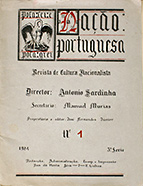

................................
The 6th edition sought to question the future at a time when there were "devastating discoveries" in science and human thought was at a real crossroads—it was plagued by doubt, a supposedly false spiritualism, and a spiritual cataclysm (António da Silva Rego, "Nova Renascença ?" [A New Renaissance?"], series VI, 1929).
Among the main themes and debates addressed, these stand out: the return to tradition, the critique of constitutionalism, and the praise of organic monarchy as opposed to "Chartist" republicanism, which dated back to the period of the Encyclopaedists and the French Revolution. This return to tradition—said to be counter-revolutionary and genuinely Portuguese (João Ameal, "A Contra- Revolução Portuguesa" [The Portuguese Counter-Revolution], series VI, 1931)—is the basis for the restoration of the organic, municipalist , or decentralising monarchy that respected the integralist maxim that the king "should govern but not administer." Through tradition—with the union of interests and professions based on corporatism/organicism—everyone would be subordinated to the power of the fatherland or integral nationalism and work towards the characterisation of the common good, building the Nation-State ideal. For integralists, tradition is the idealisation of the national past based, above all, on an imaginary Middle Age and interrupted by the rise of the Enlightenment and then liberal ideas. In the integralist vision, tradition was based on organic monarchy, and without it the nation-state would not be possible at all. "Tradition is not a single moment in the life of a people, it is not an isolated action; it is the memory of successive moments and actions, carried out at different times, but having between them an eternal vein that links them and gives them unity" ("Da renascença do tradicionalismo na arte e na política " [The renaissance of traditionalism in art and politics], no. 12, 1916. Still on the concept of tradition for the integralists, see Manuel Múrias , " Nacionalismo e Catolicismo / Conceito de tradição " [Nationalism and Catholicism/Concept of tradition] I, II, IV, 1927 and no. 10, 1927).
This work is financed by national funds through FCT - Foundation for Science and Technology, I.P, in the scope of the projects UIDB/04311/2020 and UIDP/04311/2020.
